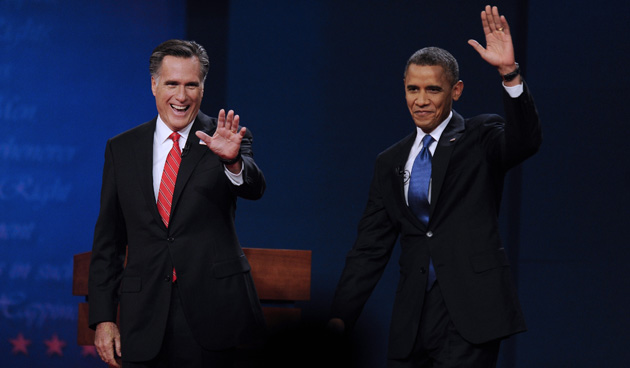
Zhang Jun/Xinhua
Hyperbole, false promises, and negative portrayals of one’s opponent are all hallmarks of a presidential campaign. Both sides do it, though not always to the same degree. Of course, the stakes are high when it comes to deciding the next “leader of the free world” so it’s no great surprise that half-truths and blatant falsehoods rule the day, or that discussion tends to generate more heat than light.
But what we’re often told is at stake and what is actually at stake on November 6 are rarely the same thing. In the contest between Barack Obama and Mitt Romney, partisans on both sides tend to exaggerate emotionally charged issues while ignoring what the election is actually about.
First, let’s look at what this election is actually not about:
1. Medicare
Despite what Republicans may say about the Affordable Health Care Act gutting Medicare, nothing could be further from the truth. The ACA actually strengthens Medicare and extends its viability by making it a more efficient program. On the flipside, no matter what Paul Ryan has put into his budget and no matter how badly he might like to transform Medicare into a voucher-based program, this is the stuff of magic and unicorns.
After all, senior citizens comprise one of the most powerful voting blocs in the United States, and regardless of political leaning, few want to see their benefits cut. This allows both parties to campaign about the ensuing destruction of Medicare while ultimately avoiding cuts to the entitlement. In fact, the only real attempt to make Medicare more efficient came in the form of the Affordable Healthcare Act.
2. Balancing the Budget
Republicans talk endlessly about balancing the budget, but whenever they have a turn in the Oval Office all fiscal conservatism dissipates into a flurry of tax cuts. Democrats only talk about balancing the budget during a massive recession out of appeasement; they’re actually much more interested in stimulating the economy. That will remain the case if Obama wins a second term.
In other words, if Republicans are in charge all talk of the deficit will cease; if Democrats are in charge, the deficit will remain a convenient political cudgel. In neither case will we magically resolve our budgetary problems.
3. Women’s Rights
Romney’s “binders full of women” gaffe may point to a deeper problem on the right with women’s rights and reproductive health issues, but the presidential election is not where these issues will be decided. As with the fight for gay rights, the fundamental battles over women’s healthcare issues will take place on a state-by-state level.
It’s true that womens’ votes matter to an Obama win, and undoubtedly Obama will friendlier to women’s issues that a Romney presidency, but the real battles for women’s rights are going to take place in state elections.
2012 is still an important election for women’s rights and gay rights, but not due to the presidential outcome. Voting in your state and local elections will be far more crucial.
4. Repealing the Affordable Healthcare Act
“Obamacare” as it is so often referrred to, isn’t going anywhere. The promises (and threats) of the GOP are as empty and meaningless as their promises to balance the budget.
Romney has already said he’d like to keep the ban on pre-existing conditions in place. What he’ll quickly discover is that the only way to keep this very, very popular provision in place would be to maintain the health insurance mandate as well. Lest we forget, the healthcare industry has deep pockets and an enormous amount of money at stake when it comes to healthcare reform. Can you imagine for a moment the insurance companies going along with a plan that forces them to accept all comers without something in return? I can’t.
Nor can I imagine a Republican government repealing the many popular provisions in the ACA. They’ll be stuck with it whether they like it or not—and years from now, they can complain about Democrats “gutting” it and talk about ways to make it more market friendly.
5. War and Peace
As the third presidential debate illustrated only too well, the foreign policies of Barack Obama and Mitt Romney are far more similar than either would like to admit. Republicans may say that Obama designed his foreign policy by apologizing for America, and they may claim that he is weak on terror and capitulates to Iran, but this is just sound and fury. Obama’s foreign policy remains far too close to that of George W. Bush—less blustering, to be sure, but Obama has ramped up the use of drones, has killed Osama bin Laden, and helped topple the Libyan regime. None of these are the hallmarks of a weak foreign policy, though I would also refrain from calling some of these decisions wise or just.
Meanwhile, although Romney wants to increase the defense budget, Obama has done far too little to actually cut the hundreds upon hundreds of billions we put into the black-hole of defense spending each year (over $700 billion for FY 2012 if you count the budget for Veteran’s Affairs); rather, whatever savings we’ve seen under the Obama administration can largely be chalked up to the ramping down of the war in Iraq.
And both candidates will continue the use of private contractors in Afghanistan, Iraq, and elsewhere, supplanting a professional military force with a mixed bag of civilians.
6. Education
President Obama has largely continued the bi-partisan education policies that began under George W. Bush. While No Child Left Behind has fallen out of fashion, the Race to the Top program shares many of the same qualities. Leadership within both parties has largely embraced a pro-charter school mentality, and while the GOP may ramp up efforts to move toward voucher and other choice-based programs, the Obama/Bush education policies would likely remain unchanged under Romney.
Again, where the most dire battles in education are taking place is at the local and state level, where state governments have gone after teachers’ unions, education budgets, and so forth in an attempt to move education closer to a privatized model.
7. Immigration
I would like this election to be about immigration, but it isn’t. Republicans are worse, on the whole, when it comes to the nativist policies that make immigration such an impossible issue to deal with, but under Obama’s administration we’ve seen an increase in deportations.
And while Obama has pushed for good policies like the DREAM Act, the real battles over immigration are – like women’s and gay rights – taking place at the state level, with noxious immigration laws in Arizona, Alabama and elsewhere driving immigration policy much more than any theoretical federal reforms.
8. Big Government
Republicans like to talk about “Big Government” as though it were the root of all evil. But the fact of the matter is, when Republicans actually rule the roost government almost always grows. Tax rates may come down (though they’ve also come down under Obama) but the government gets bigger nonetheless.
Big Government is just another bogey man, like the deficit, which gets a lot of air time whenever a Democrat is in charge but devolves into massive Medicare prescription drug programs and equally unaffordable tax cuts under Republican presidents. And while Obama and the Democrats often adopt the language of anti-Big Government to please crowds (a tactic used ever since Clinton’s famous “the days of big government are over” speech) they have no intention of shrinking important programs or the military or really any of the big budget items that might actually shrink the size of government.
So what is the 2012 presidential election all about?
It’s about something far more mundane than the imminent death of Medicare or the ACA and far less hopeful than the return to a sane foreign policy or a humane immigration reform effort. Rather, the election is about good governance and the guiding philosophy that makes Democrats better caretakers of the federal government than their Republican rivals.
Perhaps because Republicans are so hostile to all things government these days, they invariably drop the ball once they’re actually tasked with the hard work of governing. The GOP is very good at one thing: obstruction. They play the countervailing force quite well. We saw this during the Bill Clinton presidency and we’ve seen it in an even more organized form during the past four years and the rise of 24-hour cable news and the internet.
But what Republicans are far less concerned with is efficient government. The real fault of the Bush Administration during Katrina was not merely a poor response, it was the appointment of people to FEMA who had no qualifications to adminster that program.
Meanwhile, in terms of simply taking government and making it more efficient rather than attempting to cut funding to PBS, President Obama has actually gone to great lengths to root out inefficiences within the federal machine, including working to consolidate federal agencies and cutting through red tape in his effort to help with victims of Hurricane Sandy—something Republican New Jersey governor Chris Christie has praised the president for in recent days.
Certainly no government is perfect, and the Obama Administration has made its fair share of mistakes, but the glaring disasters of Iraq, Afghanistan and Katrina under the last president should serve as stark reminders of just how little the GOP is interested in the hard work of actually running the government. These events also illustrate how important it is to place competent people in positions of power within the government rather than merely idealogues or political allies.
I’ve thought for some time that the GOP might actually prefer to lose in 2012, and that this at least partly explains while the Republican primary was such a circus. Romney’s candidacy is particularly ludicrous after the ascendancy of the Tea Party on the American right, further backing this theory.
As an oppositional force with a hamstrung Senate under permanent threat of filibuster, the GOP can accomplish many of its goals without bearing the burden of responsibility. This is why you hear Republicans blame the president over and over again for not fulfilling promises they worked extremely hard to block.
“The single most important thing we want to achieve is for President Obama to be a one-term president,” Senate Majority Leader Mitch McConnell told National Journal’s Major Garrett last year, reiterating McConnell’s stated goal since taking back the Congress.
But one can’t help but wonder if in the back of McConnell’s mind he isn’t thinking that four more years of the politics of obstruction might not be more effective than a Romney/Ryan win.
Finally, the presidential election is about the Supreme Court, perhaps an even more crucial factor than any other presidential appointment. And while a Romney win doesn’t guarantee any more conservative justices on the court, it’s certainly a risk.
In other words, this election isn’t about many of the big issues of the day, it’s about an idea: How do we want our government run, and by whom? Do we trust the same party that placed people like Paul Wolfowitz and Alberto Gonzales in high positions within the federal government?
This election may not be about the death of Medicare—but it is very much about how we want that program, and the many other federal programs we rely upon, administered.















